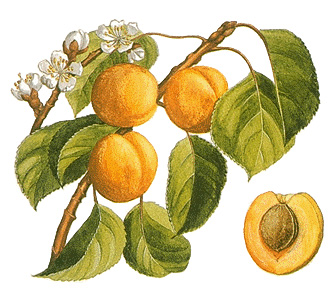Apricot, << AY pruh kot or AP ruh kot, >> is a golden, peachlike fruit with a pit. Apricots are smaller than peaches, and they have a smoother skin. Some have a reddish blush on one side. Fresh and dried apricots are eaten raw or are cooked to make jams, pies, and puddings. A liqueur is made from the kernels (seeds) found inside the pits. Most kernels are bitter, but some apricots have sweet kernels that can be eaten like almonds.

Apricot trees may grow as tall as 30 feet (9 meters). They grow best in dry and mild climates. The trees blossom in early spring, so fruit production is poor where spring frosts are common. Apricots are native to eastern Asia and were brought to North America from Europe. Iran and Turkey are the chief world producers of apricots. California is the leading U.S. producer of apricots.
Most apricot trees are grown by grafting buds onto the roots of plum, peach, or apricot seedlings. When the trees reach 1 year of age, they are transplanted from the nursery to orchards. Apricot trees are pruned more heavily than most other trees that bear their fruit on spurs (short side shoots). Larger fruit is produced by thinning (removing) some fruit from the tree when the fruit is about 1 inch (2.5 centimeters) in diameter. Most apricots are harvested by hand, though some mechanical harvesting is done in California.
